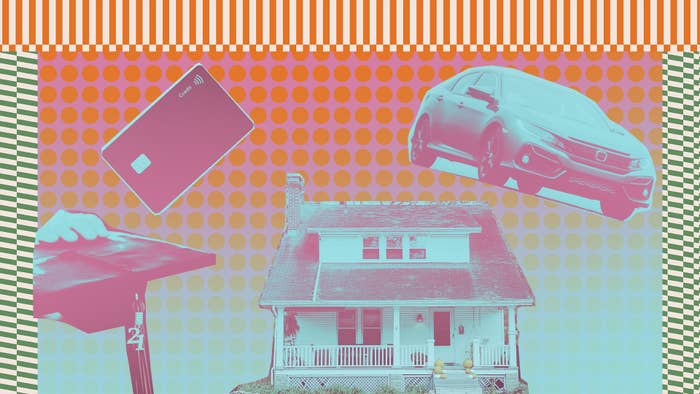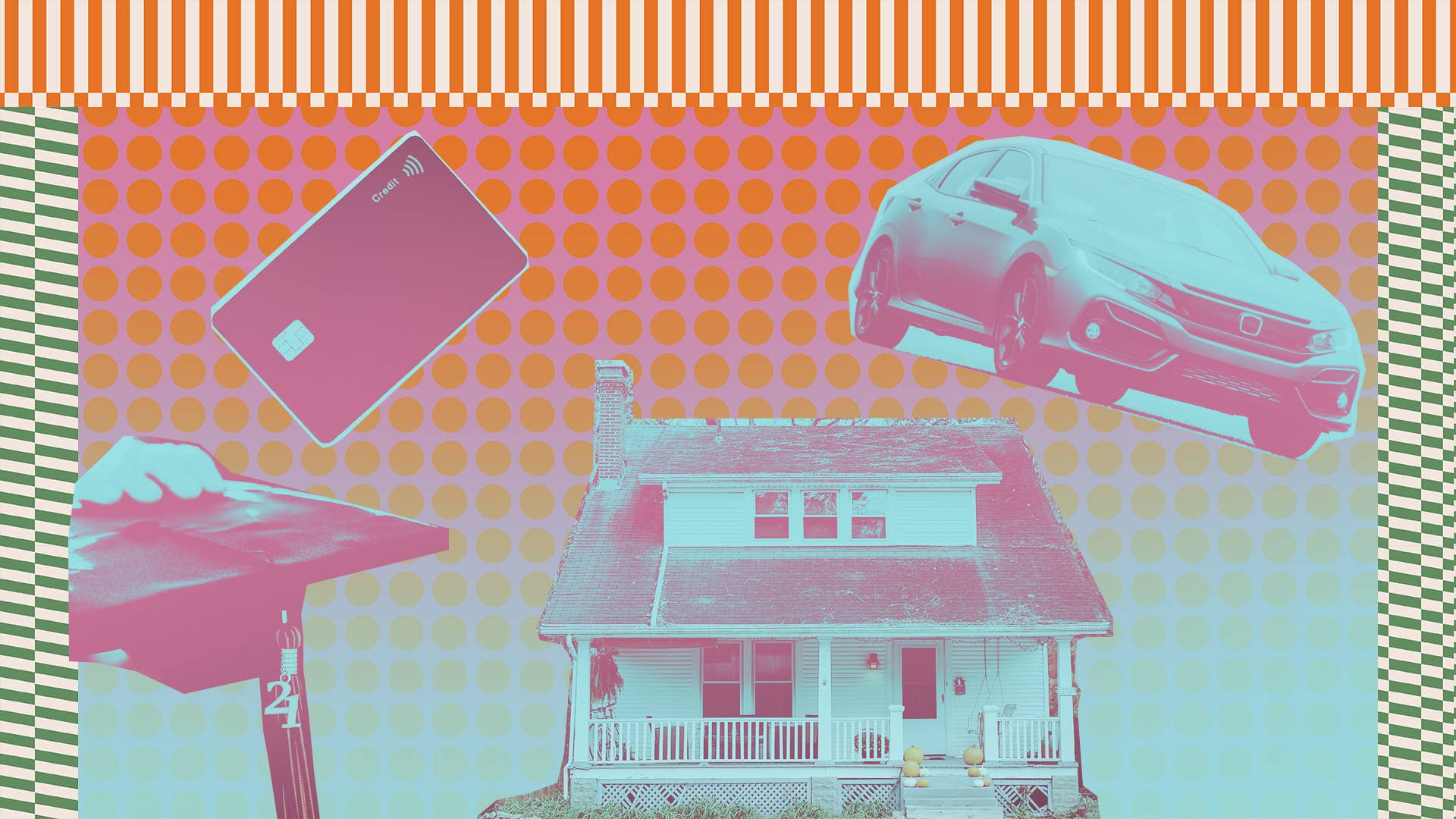
When you’re living in the United States, it’s pretty difficult to avoid debt. College is too expensive for most to pay for out of pocket these days, necessitating student loans. More and more millennials plan on renting forever, rather than paying into a mortgage, because… who among us without generational wealth can actually afford a mortgage? Even the lucky ones who can… really can’t, living with an average of over $200,000 worth of mortgage debt, according to a 2020 analysis of millennial homeowners.
It hasn’t always been this hard—people born between 1981 and 1996 entered adulthood at a more precarious moment for the economy than past generations. There was the 2008 Great Recession, the US’ largest economic downturn since the Great Depression. TLDR; the job market fell apart and millennials graduated with exorbitant student debt. The crisis led to the normalization of gig work, ushering in an increase in exploitative freelance and part-time employment, which often leave workers without access to affordable health insurance, paid time off, or fair working conditions. Millennials were also told that higher education was necessary when tuition costs were at their highest, only to watch the generation that followed increasingly succeed without the traditional college path—and benefit from finally declining tuition costs should they choose the four-year-college route.
These factors and more have made it hard for many to juggle their debt while saving for the future. That’s why we hit up certified financial planner Lauryn Williams, the founder of Worth Winning, to hear more about the first steps people can take to get out of debt.
“Everybody has a different style, and a different way they’re going to understand things—but you do need to have an understanding of your finances. Because if you don’t have a clue of what’s coming in or what’s going out, how can you ever know to grow, or put more away, or do anything like that? I check my spending every month, so I’d know if something weird showed up there. But the minimum amount of time, if you’re easy, free-spirited, is quarterly. At the end of the year, I know every dollar I spent, what category—like, I spent X dollars on food, which is an average of X per month. I use an app, which has everything accounted for. I get that that’s not for everybody, and that can be tedious for some—for the more creative, free-spirited people. But you need to have some guardrails in place, and you need to spend a little bit of time.”
“One of the biggest questions that I get is, ‘Which of these things do I prioritize? I have this debt. I want to pay it down. But I feel like I’m going to be left behind from a savings standpoint. What do I do?’ And you never sacrifice yourself, because what is the point of earning these dollars if all you’re going to do is let all these people line up every month and you hand your dollars out to them? You have to put yourself in front of that line and put something aside. So if you don’t have an emergency fund, I highly recommend starting to save, for one, even in the midst of paying down debt. So my formula is that you should go to a 15 percent savings rate if you have debt, and then 15 percent of your income should be going towards paying down debt. And then you want to keep your actual housing and variable expenses much lower until the debt is gone. And then you can increase your savings up to 20 percent and increase your discretionary spending up to 30 percent. Yes, definitely do not sacrifice saving for yourself while paying down debt.”
“You have to put yourself in front of that line and put something aside.”
“Get it all in one place, and then I would go by looking into interest rates. Generally, your credit card debt is going to have the highest interest rate, and that’s the thing we should tackle first. Your student loan debt, on the other hand, it could be federal, or it could be private. If it’s private, your only option is to pay it off. So you might as well get to it, chop chop, try to get yourself a lower interest rate by refinancing it. But with your federal debt, you want to be very careful. You’re going to need to assess whether or not you should take those federal loans and turn them into private loans to get a better interest rate or use one of the federal programs that does the Income-Driven Repayment Program to try to get access to some sort of forgiveness. And then, mortgage-wise, a lot of people have been quick to refinance because they hear the narrative on social media that says, ‘It’s a great time. Interest rates are lower than they’ve ever been.’ But there are costs associated with refinancing a mortgage. It’s not the same as refinancing student loans, where there is no additional cost associated with it. So when you’re thinking about mortgage debt, yes, I may get a lower payment, yes, I may get a lower interest rate, but what does that cost me over time? Because if I’m already 10 years into paying my mortgage and I stretch it out over 30 again, that’s going to be a lot more interest I’m going to pay over that time period. Car debt is definitely something you want to get rid of. I always say try to buy a used car; that way, you can just try to get it paid off. It’s already cheaper.
“Use your credit card, you automatically put a stop limit on there. When you hit [your budgeted discretionary spending limit], you’re done. That way, you know you can pay your credit card with this discretionary account. And then you automate all the savings. So if you’re saving for a house, that goes automatically into a savings fund, an emergency fund, whatever the case may be. All of the savings is automated, so it’s money that isn’t even available to be spent. There’s a budget. It’s created. You don’t need to monitor every single thing.”
“Before you even start dealing with the nitty-gritty of your finances, see where your mind is at. What trauma have you come up against with your finances? What money messages did you hear growing up? What are some of the goals that you have? That qualitative stuff is going to be far more important to help you get to wanting to do the quantitative stuff.
“So once you know, ‘I truly want to be a millionaire,’ ‘I want to retire by 30,’ ‘I want to pay for my kid’s college,’ you have a clear thing in mind. And the why behind those things being important to you—you know, ‘No one paid for my college and I was a foster child and didn’t have a parent my whole life, so I want to be a good parent and that’s why paying for my kid’s education is important.’ Whatever those things are that you’ve experienced will help drive those goals, and it will make it a lot easier for you to want to prioritize them and understand how it works so you can achieve them.”

